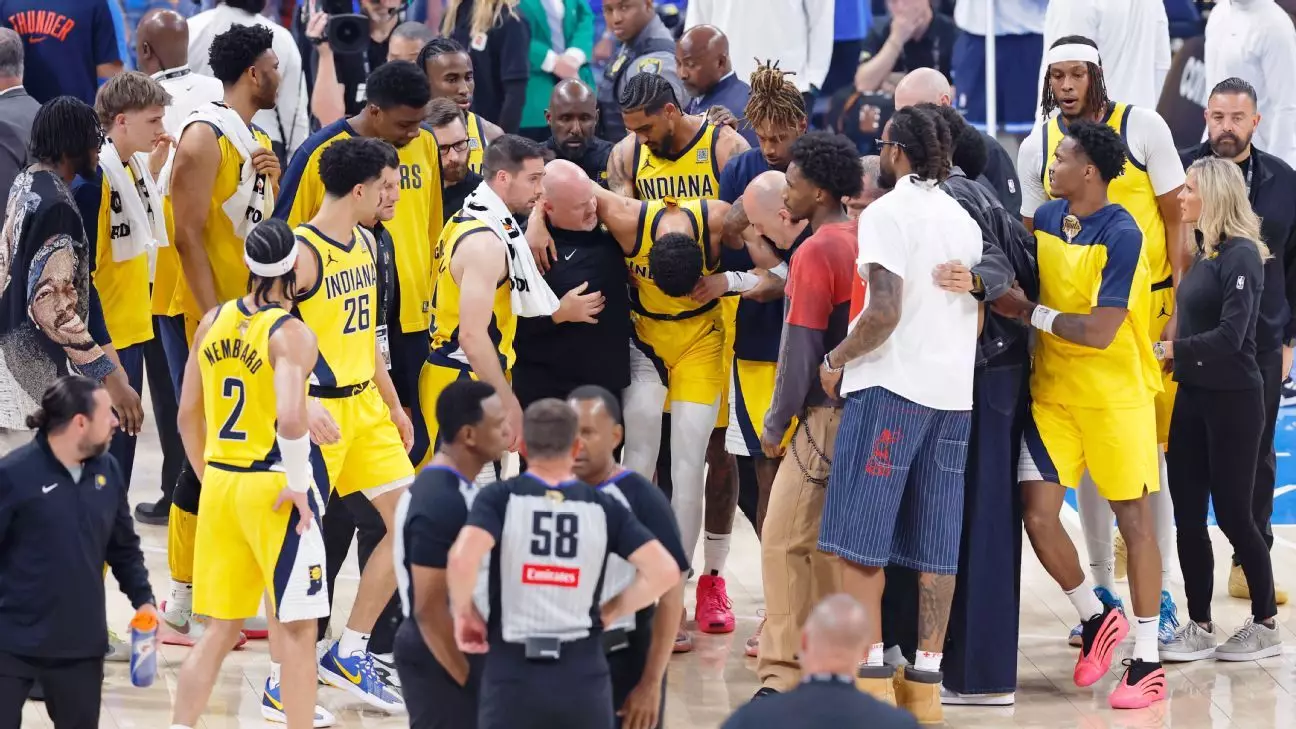In a world that reveres athleticism and valor, Tyrese Haliburton’s recent emotional confession resonates deeply, not merely as an athlete’s tale, but as a narrative of human tenacity in the face of adversity. After suffering a devastating right Achilles tear during the decisive Game 7 of the NBA Finals, Haliburton boldly stated through social media, “I’d do it again, and again after that, to fight for this city and my brothers.” This potent declaration serves as a sobering reminder of the high cost of ambition in the face of modern sports’ relentless pressures. The fervor of competition can often lead players like Haliburton to push their limits, at times disregarding their own well-being for fleeting moments of glory.
This hazardous devotion is not lost on those who have witnessed the intensity of the NBA playoffs. Haliburton, who experienced a calf strain in Game 5, decided to re-enter the arena despite being less than 100%. Playing through injury is not an uncommon narrative in sports, yet the NBA continues to glorify this “play through pain” mentality—normalizing an environment where athletes feel they must sacrifice their bodies for the sake of the team and the championship, pushing the boundaries of human endurance to the brink.
A Costly Game of Chance
It’s easy to succumb to admiration for Haliburton’s bravery and resolve; however, we must question where this valor becomes reckless. After all, how should we measure a player’s worth? Is it by their relentless pursuit of victory or by ensuring they maintain their health and longevity in the game? Haliburton’s emotional fallout illustrates vividly that professional sports are far from the fairy tale ending often portrayed in films. Lines drawn in the sand blur quickly when pride and stakes rise—forcing athletes into difficult decisions about their health and future.
Moreover, as Haliburton faced his injury with an air of acceptance, stating he would “come back stronger,” a familiar refrain echoed in locker rooms across the league, one must ponder whether this optimism is genuinely helpful or merely a coping mechanism. Reinforcing the stigma around injury, phrases like “you will come back stronger” can diminish the reality of the emotional and physical toll taken. The sheer weight of Haliburton’s expression of frustration, where he candidly remarked that “this s— sucks,” reveals the vulnerability behind the show of strength, which often goes unnoticed.
Shocks, Dreams, and the Road Ahead
The athlete’s journey, highlighted by Haliburton’s poignant reflections, underscores a critical but often overlooked aspect of sports: the mental strains that go hand in hand with physical afflictions. Following the devastating end to his playoff run, Haliburton declared that he is “grateful for the road that lies ahead.” This glimmer of appreciation for a painful journey does not dismiss the daunting path of recovery. However, it equally hints at a broader cultural issue demanding attention within the sport: the necessity for athletes to prioritize mental well-being alongside their physical training.
Haliburton’s situation does not exist in isolation, as he is but one of many stars grappling with injury narratives. The NBA is witnessing a troubling trend, with notable players succumbing to similar fates, reflecting an urgent need for systemic change on how injuries are managed across the league. The culture encouraging players to prioritize their allegiance to their teams over their health must be examined critically. The players’ sacrifices, their determination to fight through injuries, should not only be admired. Instead, they should spark a much-needed conversation about accountability, future safeguards, and the establishment of more compassionate protocols governing athlete health.
In his painful but honest acknowledgment of the situation, Haliburton epitomizes a new generation of athletes who are not afraid to embrace and share their vulnerabilities. This renouncement of the armor of invincibility represents a significant leap toward a culture that values well-being alongside athletic achievement, one where the narrative shifts from toxic machismo to a more supportive framework. Ultimately, Haliburton’s journey teaches us that endurance comes with a price, and the true battle is as much mental as it is physical.

Leave a Reply